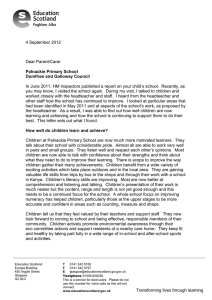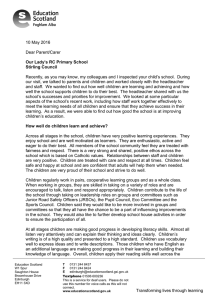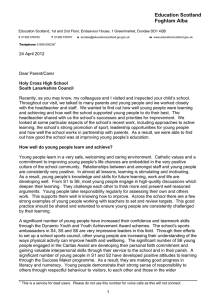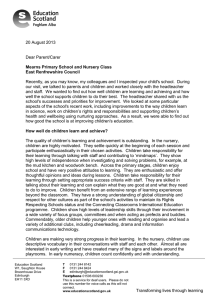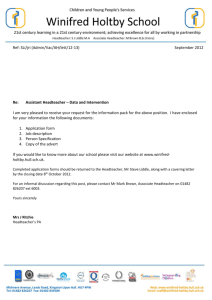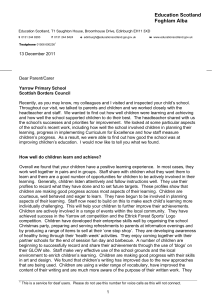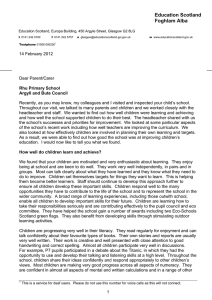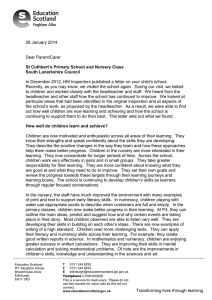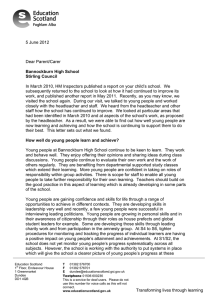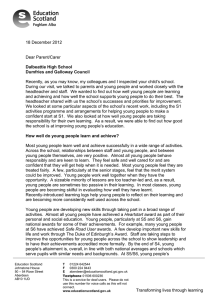19 January 2016 Dear Parent/Carer ’s school. During
advertisement
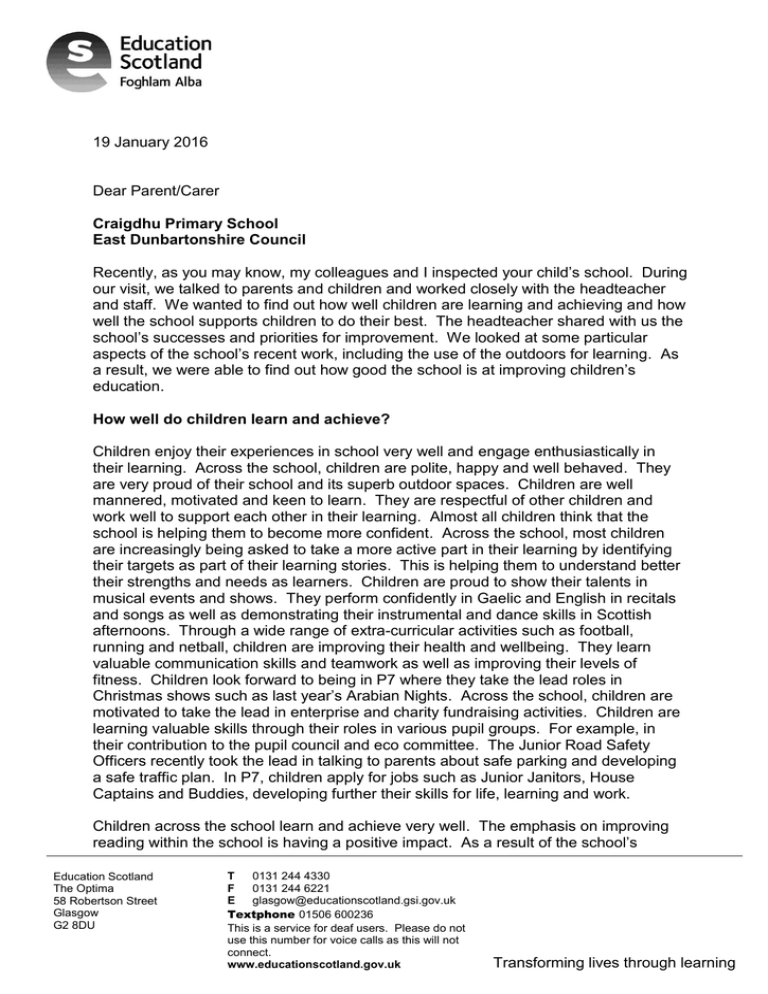
19 January 2016 Dear Parent/Carer Craigdhu Primary School East Dunbartonshire Council Recently, as you may know, my colleagues and I inspected your child’s school. During our visit, we talked to parents and children and worked closely with the headteacher and staff. We wanted to find out how well children are learning and achieving and how well the school supports children to do their best. The headteacher shared with us the school’s successes and priorities for improvement. We looked at some particular aspects of the school’s recent work, including the use of the outdoors for learning. As a result, we were able to find out how good the school is at improving children’s education. How well do children learn and achieve? Children enjoy their experiences in school very well and engage enthusiastically in their learning. Across the school, children are polite, happy and well behaved. They are very proud of their school and its superb outdoor spaces. Children are well mannered, motivated and keen to learn. They are respectful of other children and work well to support each other in their learning. Almost all children think that the school is helping them to become more confident. Across the school, most children are increasingly being asked to take a more active part in their learning by identifying their targets as part of their learning stories. This is helping them to understand better their strengths and needs as learners. Children are proud to show their talents in musical events and shows. They perform confidently in Gaelic and English in recitals and songs as well as demonstrating their instrumental and dance skills in Scottish afternoons. Through a wide range of extra-curricular activities such as football, running and netball, children are improving their health and wellbeing. They learn valuable communication skills and teamwork as well as improving their levels of fitness. Children look forward to being in P7 where they take the lead roles in Christmas shows such as last year’s Arabian Nights. Across the school, children are motivated to take the lead in enterprise and charity fundraising activities. Children are learning valuable skills through their roles in various pupil groups. For example, in their contribution to the pupil council and eco committee. The Junior Road Safety Officers recently took the lead in talking to parents about safe parking and developing a safe traffic plan. In P7, children apply for jobs such as Junior Janitors, House Captains and Buddies, developing further their skills for life, learning and work. Children across the school learn and achieve very well. The emphasis on improving reading within the school is having a positive impact. As a result of the school’s Education Scotland The Optima 58 Robertson Street Glasgow G2 8DU T 0131 244 4330 F 0131 244 6221 E glasgow@educationscotland.gsi.gov.uk Textphone 01506 600236 This is a service for deaf users. Please do not use this number for voice calls as this will not connect. www.educationscotland.gov.uk Transforming lives through learning approaches, almost all children are confident and enthusiastic readers. Children like having a library space in each area with books for their stages. From P4, children who are confident and independent readers select texts from the class libraries as their home readers. They are highly motivated by this approach. They can select and discuss a range of genres and authors for their reading, justifying the texts chosen. Children’s skills in writing are developing effectively as they move through the school. Children in P1 are able to add detail to their drawings of what happens next in a story and confidently tell an adult scribe about this to complete the story. A few children are keen to ‘write’ their own stories. At P3, children can write independently and at length on topics that are familiar to them. They are confident in ‘having a go’ at spelling unfamiliar words needed for their writing. They are beginning to use dictionaries to help them improve their writing. By P7, children are confident and able writers, writing for a wide range of purposes. Children are increasingly able to select interesting vocabulary and are beginning to use different styles to engage the readers. Overall, the quality of attainment in numeracy and mathematics is very good. Almost all children enjoy and are successful in their mathematics. They particularly like more active approaches to learning. For example, younger children were using the outdoors to select, sort and count objects. Older children were engaged well when drawing life sized pictures of whales in the playground to work out scale. This allows children to link their learning with a novel they are reading together. Children are developing their numeracy skills in real-life situations. For example, in P1, children were counting cake cases. In P5, they were rounding and estimating the costs of buying goods in a shop. In the P7 group, almost all were confident in calculating the area and perimeter of simple 2D shapes and a few were confident in working out the volume of 3D objects. Children are able to talk well about how they use a range of problem solving strategies to help them. Almost all children are confident and accurate in their mental mathematics. Across the school, children are making very good progress in most other areas of their learning. How well does the school support children to develop and learn? The school’s approaches to meeting the needs of all children are good. The school has a very supportive ethos where all adults understand their responsibility for providing a safe and inclusive learning environment for children. Across the school, most tasks and activities are well matched to the needs of children. There remains scope to challenge higher-attaining children. For example, in national mathematics competitions and in activities in some classes. There are educational plans in place for all children who need them and these are reviewed regularly to plan appropriate support. However, there is a need for clearer and more specific targets contained within the plans and more robust mechanisms for reviewing and recording children’s progress. A range of assessments are being used by teachers to evaluate the progress being made by children as they move through the school. The depute headteacher works effectively with a range of partners to ensure children’s needs are being met. The needs of most children requiring additional support are being well met through targeted support, group work and support in class. Almost all children responding to the Education Scotland questionnaire said that they felt safe and cared for in school and they get help when they need it. Across the school, the curriculum is broad and balanced. The school is taking into account national guidance for Curriculum for Excellence. The school makes good use 2 of a range of partners to enhance the curriculum. It would be helpful for the headteacher and school to revisit the rationale for the curriculum and to express this more clearly. Local businesses and parents help support activities which enrich the experiences for children. The outdoor areas are used well as a stimulating environment for learning. Children learn and explore the wooded outdoor classroom area at lunchtimes and breaks as well as during class time. The staff have been developing a new programme for social subjects with teachers in Douglas Academy and local primary schools. This has the potential to build learning more closely around the key skills which children need to acquire. We have suggested the school builds on the best features of this programme as it takes this approach forward in other curricular areas. The school has plans to develop further the teaching of science and food technology. Teachers have already been sharing ideas about how to provide improved learning experiences. Children across the school like to use their French skills and knowledge which they begin studying in P1. The school works well with local early learning and childcare centres to ensure a smooth transition into P1. In P6, children are now taking part in the ‘Going for Gold’ visit with other cluster primary schools at Douglas Academy. Children in P7 benefit from close links with the secondary school and enjoy a set of new challenges as they prepare to move to secondary school. How well does the school improve the quality of its work? The headteacher is very experienced and committed to the continuous improvement of Craigdhu Primary School. She is very well respected by the whole school community. Parents find her approachable and responsive to any concerns they raise. Children are keen to share with the headteacher their successes and achievements outside of school. She is supported well by her depute headteacher and principal teacher. Through jotter sampling, visits to lessons and planning meetings with teachers, senior leaders help teachers to make improvements which benefit the children. Staff are very hard working and are committed to providing the best for the children in the school. Teachers work together to reflect on and improve their work. They are often innovative and share their new ideas and approaches with each other. As a result, the school has been able to improve how children read across the school. Teachers are also trying to introduce more opportunities for children to develop their thinking skills. Teachers visit other schools to observe good practice elsewhere and share their expertise with other schools. The staff readily accept leadership roles in the school and there is scope to develop this further. The headteacher and her staff have shown their commitment to acting on feedback from parents. They recently introduced a ‘you said – we did’ approach to illustrate improvements made. This inspection found the following key strengths. Very polite, motivated children who are very proud of their school. Children’s high attainment and achievement in literacy, mathematics and numeracy. The staff’s shared responsibility for improvement developed by the headteacher and depute headteacher. The positive involvement and support of parents. Very good use of the outdoors as a learning environment. 3 We discussed with staff and East Dunbartonshire Council how they might continue to improve the school. This is what we agreed with them. Continue to develop the curriculum in line with the principles of Curriculum for Excellence. Further improve approaches to self-evaluation and meeting learners’ needs, to ensure all children are challenged and achieve. What happens at the end of the inspection? We are satisfied with the overall quality of provision. We are confident that the school’s self-evaluation processes are leading to improvements. As a result, we will make no further visits in connection with this inspection. As part of its arrangements for reporting to parents on the quality of education, East Dunbartonshire Council will inform parents about the school’s progress. Gary Johnstone HM Inspector Additional inspection evidence, such as details of the quality indicator evaluations, for your school can be found on the Education Scotland website at http://www.educationscotland.gov.uk/inspectionandreview/reports/school/primsec/Crai gdhuPrimarySchoolEastDunbartonshire.asp If you would like to receive this letter in a different format, for example, in a translation please contact the administration team on the above telephone number. If you want to give us feedback or make a complaint about our work, please contact us by telephone on 0131 244 4330, or e-mail: complaints@educationscotland.gsi.gov.uk or write to us addressing your letter to the Complaints Manager, Denholm House, Almondvale Business Park, Livingston EH54 6GA. 4
